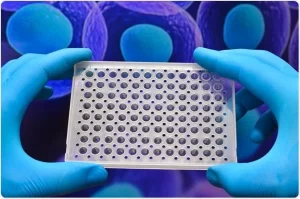
The protein chip market refers to the industry that provides technologies and products used for the analysis of proteins. The market includes various products such as protein microarray chips, surface plasmon resonance (SPR) chips, and lab-on-a-chip (LOC) devices for protein analysis. These technologies are used for a wide range of applications, including drug discovery and development, diagnostics, and basic research in life sciences. The protein chip market is growing due to increasing demand for high-throughput and low-cost protein analysis methods. Key players in the market include Thermo Fisher Scientific, Agilent Technologies, PerkinElmer, and Roche.
Global protein chip market was valued at $652.8 million in 2020, and is projected to reach $1,367.1 million by 2030, registering a CAGR of 7.5% from 2021 to 2030.
What are protein chips used for?
Protein chips, also known as protein microarrays, are used for a wide range of applications in the field of life sciences and biotechnology. Some of the common uses of protein chips include:
Drug discovery and development: To screen large numbers of compounds for their potential to interact with target proteins and to determine the binding specificity and affinity.
Diagnostics: To identify disease markers and monitor disease progression, as well as to develop new diagnostic assays.
Proteomics research: To study the protein expression patterns in a high-throughput manner and to identify protein-protein interactions.
Toxicity testing: To assess the toxicity of potential drug candidates and environmental contaminants on a cellular and molecular level.
Biomarker discovery: To identify new biomarkers for diseases and to validate existing biomarkers.
Overall, protein chips provide a high-throughput and cost-effective method for analyzing proteins, which is useful for a wide range of applications in life sciences and biotechnology.
What are protein chips used for?
Protein chips, also known as protein microarrays or protein arrays, are tools used for high-throughput analysis of proteins. They are similar to DNA microarrays and are used to measure the expression levels of many proteins at once. Here are some of the main applications of protein chips:
- Protein identification: Protein chips can be used to identify unknown proteins by comparing their expression levels with a reference database.
- Protein quantification: Protein chips can be used to quantify the amount of a specific protein or a set of proteins in a sample.
- Protein interaction analysis: Protein chips can be used to study the interactions between proteins and other molecules, such as ligands or drugs.
- Protein modification analysis: Protein chips can be used to analyze the presence and location of post-translational modifications, such as phosphorylation or acetylation, in a set of proteins.
- Diagnostics: Protein chips are being used to develop diagnostic assays for a variety of diseases, including cancer, cardiovascular diseases, and autoimmune disorders.
Protein chips provide a rapid and cost-effective way to study proteins on a large scale. They have the potential to revolutionize our understanding of the proteome and enable new advances in drug discovery and disease diagnosis.
A protein biochip, also known as a protein microarray or protein array, is a type of laboratory tool used to analyze proteins. A protein biochip is a glass slide or other solid surface that has been coated with a collection of proteins or peptides. The proteins or peptides are usually arranged in an organized pattern, allowing for high-throughput analysis of many proteins at once.
Protein biochips are used for a variety of applications, including:
- Protein identification: By comparing the expression levels of proteins in a sample to the reference protein patterns on the biochip, researchers can identify unknown proteins.
- Protein quantification: Protein biochips can be used to quantify the amount of a specific protein or a set of proteins in a sample.
- Protein interaction analysis: Protein biochips can be used to study the interactions between proteins and other molecules, such as ligands or drugs.
- Protein modification analysis: Protein biochips can be used to analyze the presence and location of post-translational modifications, such as phosphorylation or acetylation, in a set of proteins.
- Diagnostics: Protein biochips are being used to develop diagnostic assays for a variety of diseases, including cancer, cardiovascular diseases, and autoimmune disorders.
Protein biochips provide a rapid and cost-effective way to study proteins on a large scale. They have the potential to revolutionize our understanding of the proteome and enable new advances in drug discovery and disease diagnosis.
DNA chips and protein chips are both types of microarrays, but they differ in the type of biomolecule that they are used to analyze.
A DNA chip, also known as a DNA microarray, is a laboratory tool used to analyze DNA. A DNA chip is a glass slide or other solid surface that has been coated with a collection of DNA fragments or oligonucleotides. The DNA fragments or oligonucleotides are usually arranged in an organized pattern, allowing for high-throughput analysis of many DNA sequences at once. DNA chips are used for a variety of applications, including gene expression analysis, genotyping, and DNA mutation analysis.
A protein chip, also known as a protein microarray or protein array, is a laboratory tool used to analyze proteins. A protein chip is a glass slide or other solid surface that has been coated with a collection of proteins or peptides. The proteins or peptides are usually arranged in an organized pattern, allowing for high-throughput analysis of many proteins at once. Protein chips are used for a variety of applications, including protein identification, quantification, interaction analysis, modification analysis, and diagnostics.
To analyze the proteome using a protein chip, researchers first prepare a sample containing the proteins of interest. The sample is then applied to the protein chip, and the proteins bind to their corresponding spots on the chip. The binding can be detected using various techniques, such as fluorescence or radioactivity, allowing the researchers to quantify the amount of each protein in the sample.
Protein chips provide a rapid and cost-effective way to study proteins on a large scale. By allowing the analysis of many proteins at once, protein chips have the potential to revolutionize our understanding of the proteome and enable new advances in drug discovery and disease diagnosis.

